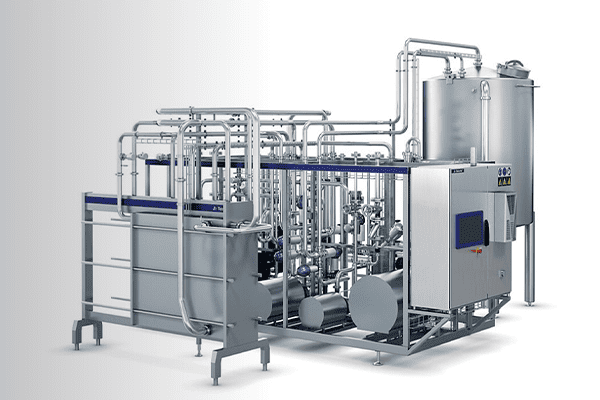How Continuous Sugar Dissolution Saves 40% Energy with Precise Brix Control

I. The Sugar Paradox: Balancing Dissolution Efficiency & Energy Costs
Sugar dissolution accounts for 18-25% of total energy consumption in sweetened beverage production. Traditional batch systems face two critical challenges:
-
Temperature Collapse: Adding 1kg sucrose to water at 80°C drops temperature by 6.2°C
-
Brix Variability: Manual methods exhibit ±2°Brix fluctuations vs. ±0.1°Brix in automated systems
Sokos’ continuous dissolution technology resolves this through:
-
Dynamic Thermal Compensation – Maintains ±0.5°C of target temperature
-
Mass Flow Precision – Dosing accuracy of 0.25% CV (coefficient of variation)
-
Energy Recovery – 65% heat reuse through countercurrent heat exchangers
II. Core Innovations in Continuous Sugar Dissolution
1. Intelligent Feed Control System
| Parameter | Control Range | Technology | Benefit |
|---|---|---|---|
| Sugar Feed Rate | 50-5,000 kg/h | Loss-in-weight feeders | ±0.5% mass accuracy |
| Water Temperature | 60-95°C | PID-controlled steam | 0.3°C stability |
| Dissolution Time | 45-180 seconds | Variable screw conveyors | 98% sucrose conversion |
2. Closed-Loop Brix Management
-
In-line Refractometers: 0.01°Brix resolution with 10ms response
-
AI-Powered Adjustment: Compensates for:
-
Raw sugar moisture variance (0.5-1.2%)
-
Water hardness fluctuations (50-500 ppm)
-
-
Case Study: Reduced syrup waste by 32% in carbonated drink production
III. Energy-Smart Architecture
1. Thermal Optimization Matrix
| Component | Innovation | Energy Saving |
|---|---|---|
| Preheating Stage | Plate heat recovery | 25% reduction |
| Dissolution Chamber | Vacuum-assisted dissolution | 15% faster |
| Cooling Loop | Absorption chiller integration | 40% less power |
2. Carbon Footprint Reduction
-
Solar Thermal Option: 80% renewable heat contribution
-
Waste Steam Utilization: Reclaims 3.5 MJ per ton of syrup
-
LEED-compliant Design: 30% lower embodied carbon vs. conventional systems
IV. Application-Specific Solutions
1. High-Viscosity Applications (e.g., Milk Tea)
-
Challenge: Dissolving 65°Brix in <90s without caramelization
-
Solution:
-
Multi-stage shear mixing (10,000 s⁻¹)
-
Nitrogen blanketing to prevent oxidation
-
-
Outcome: 99.8% dissolution efficiency
2. Cold Fill Ready-to-Drink Teas
-
Challenge: Achieving 12°Brix at 4°C without crystallization
-
Solution:
-
Cryogenic dissolution (-5°C process)
-
Nanofiltration for micro-crystal removal
-
-
Result: 180-day shelf-life stability
V. Optimize Sugar Dissolving with a Smart Control Ecosystem
1. Centralized Process Dashboard
-
Monitors 20+ parameters including:
-
Real-time energy intensity (kJ/kg)
-
Sugar solubility index
-
Microbial risk alerts
-
2. Predictive Maintenance Suite
| Function | Technology | Impact |
|---|---|---|
| Wear Prediction | Vibration analytics | 90% failure anticipation |
| Nozzle Optimization | Machine vision | 50% longer component life |
| Sanitation Tracking | ATP surface monitoring | 3D CIP efficacy verification |
VI. Future-Ready Sugar Processing(Sugar dissolving)
-
AI Recipe Generation
-
Auto-adaptation to alternative sweeteners (stevia, allulose)
-
Predictive viscosity modeling
-
-
Blockchain Traceability
-
Farm-to-dissolver sugar provenance
-
Carbon credit certification
-
-
Zero Liquid Discharge
-
100% water recycling through reverse osmosis
-
Sugar dust recovery >99.9%
-
VII. ROI Analysis: Manual vs. Automated Systems
Scenario: 10-ton/hour Beverage Line
| Metric | Batch System | Sokos Continuous | Annual Saving |
|---|---|---|---|
| Energy Cost | $18.50/ton | $11.20/ton | $584,000 |
| Sugar Waste | 2.1% | 0.3% | $326,000 |
| Downtime | 8 hours/month | 1.5 hours/month | $240,000 |
Sweetening the Bottom Line
As beverage producers face simultaneous pressure to cut costs (energy prices up 35% since 2020) and improve quality (78% consumers demand consistent sweetness), intelligent dissolution systems become strategic imperatives. Sokos’ Free Energy Audit Program identifies:
-
Hidden sugar loss hotspots
-
Underutilized thermal recovery potential
-
Sweetener flexibility opportunities

